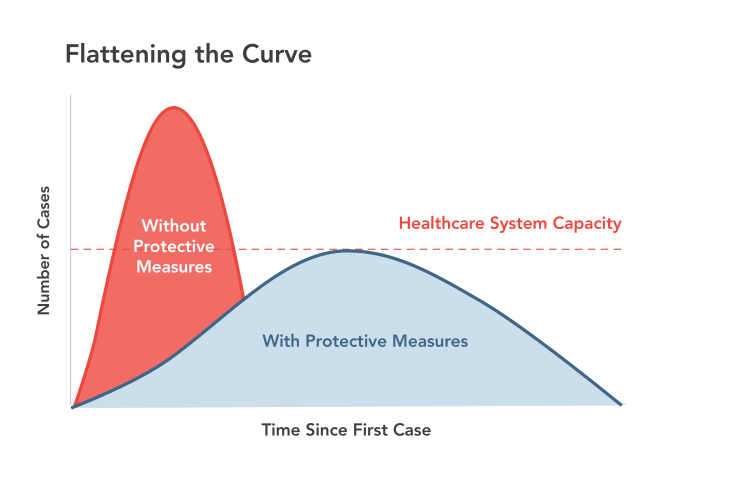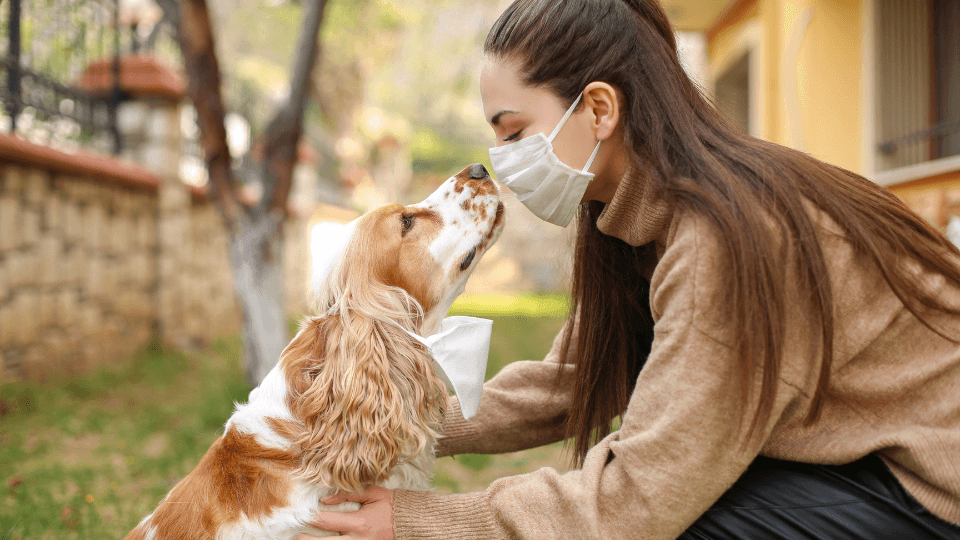Amid the COVID-19 coronavirus, the US is pushing for self-quarantine across the board. Social-distancing is key to flattening the curve and reducing the weight our healthcare system needs to bare. Luckily, pet parents can find great company in their furry counter-parts.
Dr. Hodges, DVM, guides pet parents on keeping their cats and dogs happy and healthy while social-distancing:
- What items should pet parents have on hand?
- How can pet parents help their pets feel calm?
- What are the best activities to keep your pet engaged and entertained?
- What should you do if you need to visit the veterinarian?
- Is fostering a good idea right now?
 ^This image is adapted from the CDC
^This image is adapted from the CDC
What items should pet parents have on hand amid COVID-19?
Food and litter
Having at least a month's worth of "pet essentials" like food and litter should be a major consideration. Fortunately there are so many tools to order these items online nowadays, so you shouldn't need to leave your house if you are in short supply. I'd also like to remind pet owners that when an animal's activity is reduced, they need less calories (just like you and I). If you're not taking your pup to the dog park as frequently, their caloric intake should be around 20-30% less, but this really depends on your pet, their habits, and activity levels.
While ordering online is helpful for social-distancing, if you're not able to wait for delivery, your local pet supply store will likely be open. On March 16th, 2020, over 200+ pet store owners and managers submitted an open letter to government officials making the case for pet stores to be classified as "essential retailers". The effort was successful, and pet stores are exempt from any mandatory closures!
Pet medications
If your pet is on medication please evaluate how much you have on hand. If you are going to run out within the month, contact your veterinarian. We really don't know what the next month will result in so it's better to be prepared (exploring pet insurance might make sense as well). Many medications are essential for your pet's continued health and discontinuing suddenly, sometimes missing even just a few doses, can have severe consequences.
There are also some medications you can get over the counter that may be beneficial for your fur-baby. These vary widely for pet and circumstance. An example though is Famotidine (Pepsid) and pumpkin (NOT pumpkin pie mix, but pure pumpkin). Famotidine is usually safe and helps reduce stomach acid and can help with upset stomachs. Pumpkin is a great fiber substitute that can help curb diarrhea.
That said, be sure to confirm with your veterinary team before using any over-the-counter alternatives.
How can pet parents help their pets feel calm at a time when we're all a bit on-edge?
Pet-itiation ;)
Look inward.
Dogs are pack animals and cats are territorial. If there is fear and panic in the pack or territory, it is going to influence your pets. They will feed off of your anxiety and stress, so work hard to focus on your own relaxation and stress management strategies.
Easier said than done, I know - but your inner peace and stability is important for both your own wellbeing and your pets who tune into those emotions. I recommend dedicating just 10 minutes a day, three or four days a week, to exploring meditation. For some, meditating with pets can even increase the likelihood of feeling connected and relaxed.
And according to Dr. Sung, one of 62 board-certified veterinary behaviorists in the US:
"When you take deep breaths and relax, your body postures relax. Dogs read human body language a lot better than we read their body language. So if you have had multiple meditation sessions, they have learned that this is the time Mom is going to sit still and relax. They have learned from previous experience what is about to happen next and then they start to slowly relax. The more often you practice a behavior, the easier it is to perform, just like a habit."
Healthy routines
Adding to the above, animals are creatures of routine! So please do what you can to maintain their normal routine.
Routines are very important to eating and eliminations (i.e. taking a walk with a doggie bag). Change is often stressful to cats and dogs. A disrupted routine can cause anxiety, discomfort, and accidents.
I also advise resisting the urge to give more treats if activity levels have dropped (see above in regards to decreasing calorie intake). Frozen green beans and carrots are two treat substitutes I recommend for pet owners. I find a surprising amount of pets love these treats and they are essentially zero calories.
NOTE: If you are seriously concerned about your pets anxiety or energy levels without being able to engage in normal exercise activity, there are anti-anxiety medications your veterinarian can provide. But, reaching for medications is certainly not our first-line choice.
What are the best activities to keep your pet active and entertained?
Mental games are the best tools for confined pets. Think of cat or dog versions of crosswords or sudoku.
Instead of just feeding Fido in his bowl, you could do some training exercises and present his food as the reward. Or perhaps you hide kitty's food within a rolly toy that they have to "hunt" and bat to release the kibble. Instead of kitty getting fed in a single portion, his meal is split up into multiples and hidden in various places, throughout the house. Make sure he has ample access to these areas, and show him one or two, this way he can "hunt" for other food throughout the house. Why not create a mini obstacle course in your home and have your pet follow your treat-filled fingers up and down, over and under - create an adventure as you would a toddler.

While there are many toys that are mentally stimulating for pets, ultimately what's important is that you are setting aside 20 to 30 minutes each day for dedicated play time. For pets, about 20 minutes of cognitive engagement is the equivalent to an hour of physical activity, according to expert advice published by Porch.
We can not encourage you enough to play with them and give them your full attention at playtime. You'll find your connection with your pet will grow significantly, and they'll love you all the more for it.
Alternatively, dog moms/dads can also find a local park or dog area but go during off hours and avoid other people and pets. For the sake of everyone's health diligently adhere to social distancing and local guidelines. Bring some hand sanitizer and use before and after touching anything!
According to the American Veterinary Medical Association (AVMA):
“If you are not ill with COVID-19, you can interact with your pet as you normally would, including walking, feeding, and playing. You should continue to practice good hygiene during those interactions (e.g., wash hands before and after interacting with your pet; ensure your pet is kept well-groomed; regularly clean your pet’s food and water bowls, bedding material, and toys).
“Out of an abundance of caution, it is recommended that those ill with COVID-19 limit contact with animals until more information is known about the virus. Have another member of your household take care of walking, feeding, and playing with your pet. If you have a service animal or you must care for your pet, then wear a facemask; don’t share food, kiss, or hug them; and wash your hands before and after any contact with them.”
What should pet parents do if they need to visit the veterinarian?
We encourage as much communication as possible as there are some issues that do not warrant an urgent visit during these times.
More importantly, know that your local veterinary team deals with infectious disease on a daily basis and that they're experienced in preventing the spread of germs.
Many veterinary clinics are adapting to COVID-19 by offering curbside exams, drop off appointments, picking up pets, telemedicine appointments, and sterilizing more frequently.
In terms of getting to the vet clinic, avoid public transit at all costs. The best option is to drive yourself, and if you don't have a car use Uber or Lift (and be careful).
Is fostering a good idea right now?
As I mentioned at the start of this guide, pets make excellent company while we're all practicing social-distancing and self-quarantine. Many shelters and non-profits have been closed or seen a great reduction in staffing due to COVID-19, which means many cats, dogs, kittens, and puppies need our help.
Fostering right now can really help the petcare systems we have in place and drastically improve the lives of many animal companions. Fostering is a great way to enjoy the company of a pet, help make a positive impact, and stave off loneliness of social isolation - all without the long-term commitment of an official adoption.
What more, is many non-profit rescue groups will help fund your fostering efforts, often covering the costs of pet-essentials such as food, litter, and vet visits.
Check with your local veterinarian, rescue group, or shelter to find out how you can help.
